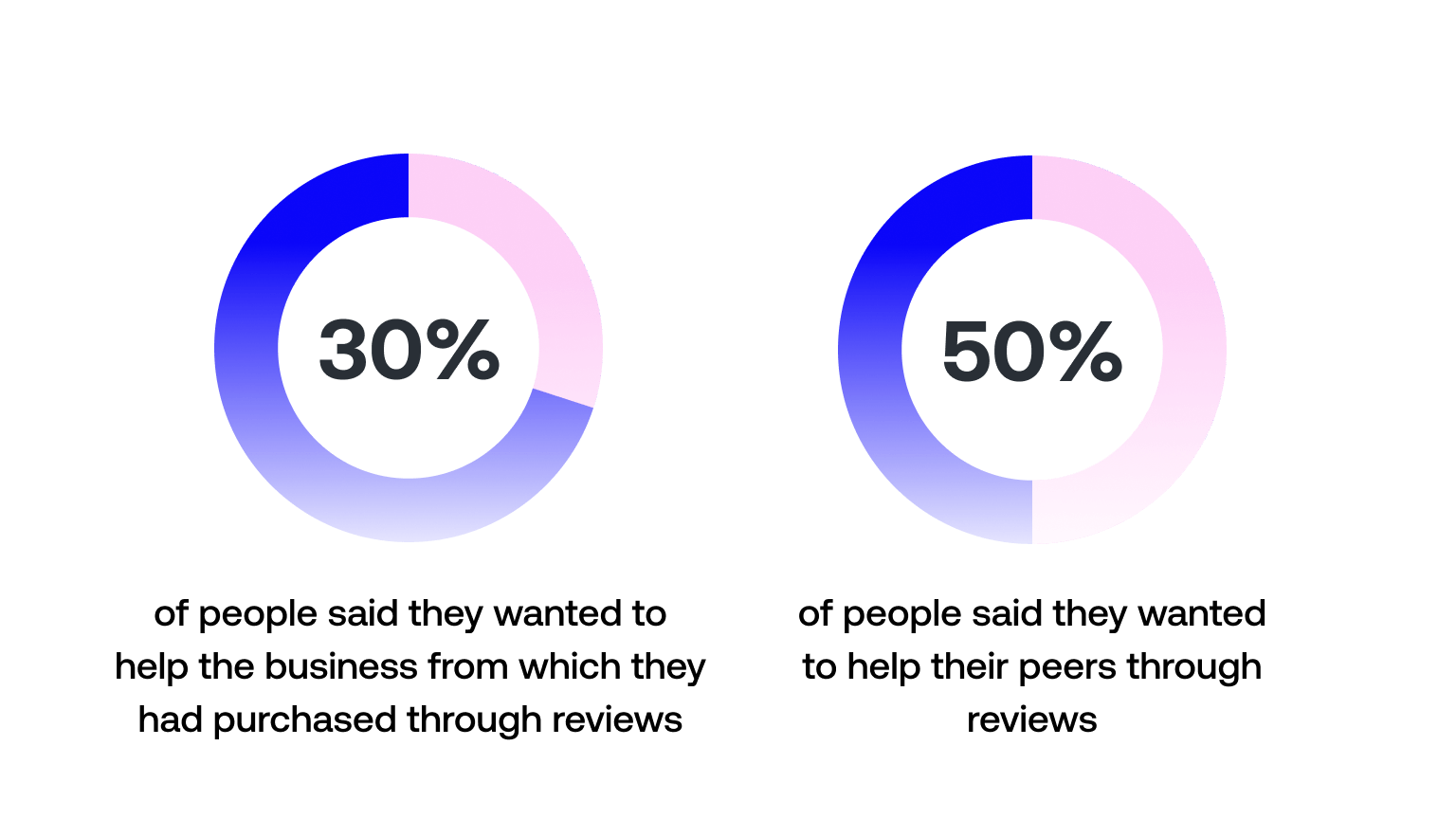
More than ever, customers are desperately looking for honest, helpful guidance when it comes to making choices about where to shop and what to buy. So, investing in creating brand advocates is something any smart marketer or business owner should have high on their list of priorities.
To say that the retail industry has been going through turbulent times in the last few years is an understatement.
A lot has already been written on how the Covid-19 pandemic introduced additional challenges for brick-and-mortar and online retailers - while they already faced a raft of macro-economic pressures.
A recent report from Barclays on new retail trends, however, suggests retailers are feeling more confident about growth over the next 12 months. In this article, we bring together some revealing industry statistics together with research carried out by Feefo. We then explore how businesses can take advantage of new opportunities and gain a competitive advantage by harnessing the power of advocacy.
The impact of the pandemic
As the pandemic hit, consumers became more cautious about spending. High-ticket purchases dropped as a result, with people focused on essential items - including new ones such as facemasks.
Brick-and-mortar retailers were already struggling with a wave of closures before Covid-19 struck. But the pandemic accelerated that decline, with the bulk of closures being on the high street. In 2021 alone, the BBC reported that more than 17,000 UK chain stores closed - including big names such as Debenhams, Laura Ashley, and the Arcadia Group.
As consumers turned to online shopping, companies that already had online sales operations or could set them up quickly fared better than physical outlet retailers. According to BusinessLive, the top 100 UK retailers reported that on average their online traffic increased by 52% during the pandemic. This included shopping for everyday essentials like groceries.
Covid-19 added more pressure to the existing issues retailers faced
Even before the pandemic, there was a raft of macro-economic hurdles that retailers had to deal with. These included:
- Inflation - one of the biggest drivers that can impact the retail market and one that hits both consumers and businesses
- Interest rates - as we’re seeing in the UK at the moment, a government strategy to control inflation is to increase interest rates. As of August 2023, the Bank of England has raised interest rates 14 times in a row, and it says they may stay high for some time to come. This obviously increases the cost of credit and can reduce consumer spending, especially on bigger purchases such as home electronics, etc
- Exchange rates - if your business operates internationally, it will be affected, positively or negatively, more than other businesses. A weak currency leads to higher import costs that can lead to increased prices on the shelves, with the opposite being true when a currency is performing well
- Economic growth - a country’s economic state, as measured by things like GDP and unemployment levels, plays a significant part in how the retail market fairs. During periods of economic growth, consumer spending is usually higher as people tend to have a greater disposable income. If an economy is shrinking, they tighten their purse strings, and consequently, retail spending goes down
- Government policies - taxation, trade tariffs, and regulations affecting products and services can have a direct impact on retail profitability. Increased taxation leaves people with less to spend. Tariffs can force prices up or even reduce the availability of imported goods
- Demographic trends - these can affect the types of products and services people use. For example, spending on youth fashion will be less in an ageing population. So retailers need to have strategies in place to meet changing consumer needs
What we’re seeing in the real world
Virtually all of the factors above, with the exception of demographic trends, have a direct impact on consumer confidence and spending - the lifeblood of retailers.
However, perhaps somewhat surprisingly, the recent report from Barclays Bank shows that 85% of retailers are more confident about growth over the next 12 months compared to last year. This is despite the impact of Covid-19 and the pressures on global markets caused by the war in Ukraine.
But companies will have to compete harder for each customer’s ‘share of wallet’. The report also points out that 84% of non-grocery and 86% of grocery shoppers have changed their spending habits and are looking around for deals because of rising prices.
Whether it’s because they have less to spend or they’re becoming more environmentally conscious, people are repairing things more than before, rather than replacing them. A Deloitte report showed over 50% of people did this in 2022. The same report showed that 40% of consumers are turning to second-hand or refurbished goods.
The power of invite-only verified customer reviews to influence shoppers
The good news for retailers is savvy shoppers aren’t buying products and services based on price alone. Research from Retail Economics has shown that in the last year, 34% of consumers have increased the time they spend researching products before they buy them.
True value for money, as well as the overall customer experience, still play a parts in people's decision-making. This is where retailers can use a verified customer reviews strategy to help them maintain sales and profitability.
A survey we carried out with YouGov in July 2023 showed that a massive 96% of UK consumers read reviews before making a purchase. It also showed that 70% of consumers trust reviews more if they’re from verified buyers - that is, people who have actually purchased the product or experienced the service before leaving a review.
As part of this research, we also asked people why they left reviews:
- 30% were telling businesses what they liked or disliked about their products or services. This type of feedback can provide insights that help companies sharpen their competitive edges.
- 50% left feedback to help other people like them spend wisely.
The way you reply to customer reviews, positive or negative, can also have a big impact on how people feel about your business. In research we carried out, 44% of people who left negative feedback would use a company again if it gave them a satisfactory reply. And 40% posted positive social media comments about a business that handled complaints well. It’s not just the reviewers that are influenced by your replies either. People reading the reviews and replies will see that you take what your customers say seriously and that you do something about it.
The Barclays retail trends research shows that retailers are taking all of this to heart and are ‘especially optimistic’ when it comes to capturing consumer feedback and confidence. 60% of them now say they’ll use what they learn to guide their business practices - for example, to develop hyper-personalised marketing strategies.
Turning verified reviewers into loyal customers and brand advocates
More than ever, customers are desperately looking for honest, helpful guidance when it comes to making choices about where to shop and what to buy.
So, investing in creating brand advocates is something any smart marketer or business owner should have high on their list of priorities.
Why? Because consumer advocates can help:
- Increase brand trust
- Reduce marketing spend
- Provide invaluable social proof
- Increase sales
- Protect your brand
- Generate invaluable insights
But how do you go about creating advocates?
Engaging with customers by asking them to leave a review is a great way to start, as it automatically extends the relationship beyond the point of purchase. It opens up a conversation.
To create true advocacy, brands need to do more than just listen, though. They must prove they care about their customers’ needs and pain points. They have to act on feedback and show consumers that their voices are heard and their opinions count. By demonstrating that you value what you’re being told and are committed to providing the best possible products and services, you can build a base of loyal customers who will become your greatest brand advocates. At Feefo, we call this The Value Exchange.
Creating advocates is, therefore, a long-term strategy. There will be some customers that engage immediately with a product or service. But, the strongest connections will form over time through repeated interactions, all of which serve to strengthen the bond between the customer and the brand.
What this all means for retailers today
The issues caused by the Covid-19 pandemic are declining, on the whole, and the majority of retailers are feeling optimistic about the future - despite the other macro-economic challenges they face. However optimism alone doesn’t guarantee business success. And old assumptions are no longer valid. Smart retailers need to steal a march on their competitors by talking to their customers, listening to what they have to say, and acting on the insights they learn. By meeting the needs and addressing the issues consumers are facing today, brands can create the lifelong advocates they need to guarantee a profitable future.
If you want to learn more about creating advocates for your business, download our Power of Advocacy report.
Talk to us
If you’d like to discover how Feefo can work for your business, get in touch. One of our team will be happy to talk you through the benefits of working with the world’s largest verified customer ratings and reviews platform.


